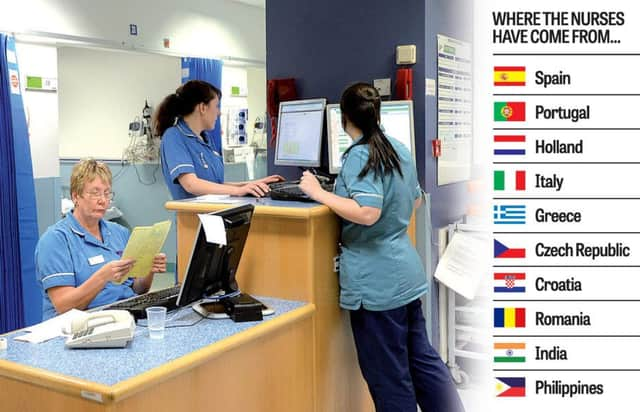Global search for nurses to staff Yorkshire wards


The recruitment difficulties are a key factor in the worsening financial crisis in hospitals which will see NHS trusts in the region with combined deficits of more than £200 million by March, partly due to a reliance on expensive agency nurses to staff wards.
The pressures led Ministers to last month lift restrictions on nurse recruitment outside Europe, putting them on the list of shortage occupations alongside ballet dancers and computer games designers.
Advertisement
Hide AdAdvertisement
Hide AdNow speculation is growing Chancellor George Osborne will next week announce measures to force student nurses to pay for their university tuition in a bid to fund a further increase in training places.
More UK student nurses are now in training but they will not be in place until 2017, leading to recruitment of overseas staff by at least 12 of 15 NHS hospital trusts serving the region. Trusts nationwide face growing scrutiny over safety in the wake of the inquiry into the Mid Staffordshire scandal, with inspectors from the Care Quality Commission repeatedly uncovering evidence of staff shortages on wards.
Nationally, figures show 7,750 people from the European Economic Area applied to join the Nursing and Midwifery Council’s register in 2014-15, with a further 665 applying from other parts of the world. In contrast, there were fewer than 2,500 foreign applicants in 2009-10.
Advertisement
Hide AdAdvertisement
Hide AdThe biggest recruiter in the region is the Northern Lincolnshire and Goole NHS trust. It employed 16 nurses from abroad in 2013, 47 last year, and 61 have started so far in 2015, from Spain, Portugal and Romania. A further 66 Filipino nurses have been offered positions.
The Doncaster and Bassetlaw trust said it made job offers in April to 60 nurses from the Philippines as part of its winter plans. But delays due to problems obtaining permission to work in the UK and more stringent English language tests mean the first will only arrive in the new year and it is now likely only around 30 will join its hospitals.
One of the problems hospitals face is retaining foreign recruits. Of 40 Spanish nurses who began working in Bradford in January, around a quarter have already left, with many saying in exit interviews “they didn’t like Bradford”.
Now managers have extended their search to the Philippines where they had success recruiting nurses more than a decade ago, with many still in post.
Advertisement
Hide AdAdvertisement
Hide AdPat Campbell, director of human resources at Bradford Teaching Hospitals NHS Foundation Trust, said £5.5m had been spent on new nurse posts in the last couple of years.
“While we continue to recruit locally and nationally – and would urge anyone looking for a job to consider Bradford - numbers coming through to appointment remain low due to a lack of available, UK-trained nurses,” she said.
Airedale NHS trust, near Keighley, is among the latest to go abroad, recruiting 29 staff from Romania and Croatia, while officials at York NHS trust say they too are now looking to Europe. Managers at Sheffield Teaching Hospitals NHS Trust say they have recently recruited 120 newly-registered UK nurses and midwives but nine Spanish nurses are joining later this month for the first time.
In contrast, hospitals in Leeds say recruitment of more than 400 more nurses this year has been achieved in the UK.
Advertisement
Hide AdAdvertisement
Hide AdSome trusts send a team abroad to recruit face-to-face while others carry out interviews online via Skype. A number offer free flights and help with moving costs.
At the Calderdale and Huddersfield NHS trust, which has recruited from Spain, new arrivals are offered a month’s free accommodation and welcome packs include crockery and food. They are offered help with English, with some reporting communication over the telephone is the biggest problem, and further difficulties understanding local accents. Tests for foreign NHS staff have been made increasingly stringent in reason years amid concerns over language barriers.